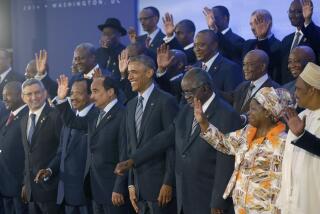What Should We Do About AIDS in Africa? Start by Asking
- Share via
When 12 million people die on one continent, what should Americans do? Does the answer change if the continent is Africa and the cause of death is AIDS? For seven years, I worked with a nonprofit agency in southern Africa--first in South Africa and then in Zimbabwe. Visits home were primers on Americans’ limited grasp of African affairs. In fact, disaster is all most people know about Africa, because Africa only sneaks into headlines with each new calamity. We pity those poor African victims with their enormous, pleading eyes, swollen bellies and spindly limbs. Through crisis coverage, Africa develops an image of absolute, endemic desperation, an almost impenetrable “otherness” to Americans.
An older gentleman once said to me, “We certainly can’t relate to Africans, but at least we have to save them.” So periodically, the United States and the rest of the first world tries to rescue Africa from its hapless state of victimhood, until it is time to forget again.
The word plague seems almost anachronistic in an age when scientists are mapping human genes. But AIDS in Africa surely is a plague--no other word does justice to the power and scope of its destruction. In Africa, I’ve flipped through pages of obituaries filled with pictures of young people mourned by their families, having died after “a long illness.” I’ve seen cemeteries with at least 100 fresh graves, and known that 100 more would have to be dug tomorrow. Because I’ve traveled through rural areas where every third home is nursing someone with full-blown AIDS, and they’re lucky if they have access to aspirin. I’ve seen death on a scale that is both awesome and mundane.
Yet I don’t see the world mobilizing around AIDS as with earlier African crises that spawned international concerns and benefit concerts. Financial assistance is flowing and discussions are taking place in certain boardrooms. But on the whole, the world’s response is scattered and woefully out of step with an epidemic that has claimed more victims than any combination of floods, famine or fighting. Why aren’t we trying to save Africans this time?
I suspect it has something to do with the fact that 97% of AIDS in Africa is spread through heterosexual sex; by men who refuse to wear condoms and women who won’t refuse sex without condoms. It is fueled by culture and poverty, but it is spread by sex. And maybe that makes AIDS unforgivable and willfully forgettable. Perhaps because the victims of AIDS are consenting adults, we blame the victims, themselves.
I also suspect that the world doesn’t know what to do: AIDS can’t be fixed quickly. Helicopters can’t hover over villages pulling people from their misery. And high-level discussions have little impact on choices made in bedrooms each night.
To understand Africa’s AIDS crisis and effectively assist with it, we would have to better understand Africans as people: how their families are structured and how spiritual beliefs influence choices. We would have to stop looking at the pleading eyes and start looking into them.
Could Africa hold our gaze for that long? Or would our ephemeral attentions be distracted by other, more accessible issues? I suspect so.
Even worse, I fear that the American public has become so inured to Africa’s implosions that 12 million deaths no longer pricks our consciences.
What should we do about AIDS in Africa? Forget about trying to answer that question. Let’s just start by asking it.
More to Read
Sign up for Essential California
The most important California stories and recommendations in your inbox every morning.
You may occasionally receive promotional content from the Los Angeles Times.










